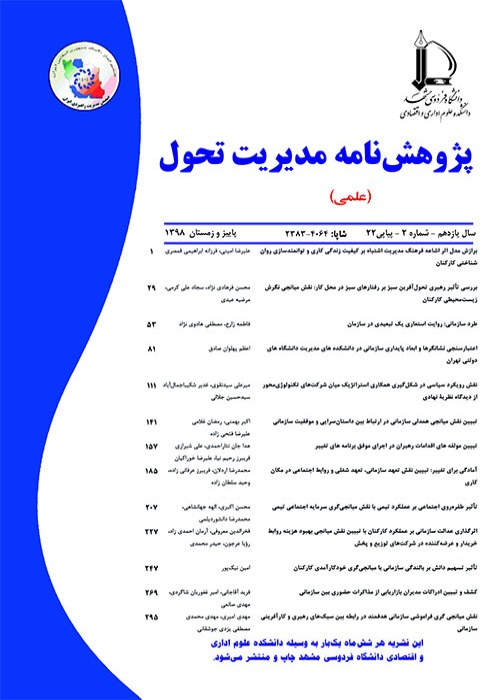Utilizing a Mixed Approach to Design a Model of Managerial Competencies Based on Organizational Health
Author(s):
Article Type:
Research/Original Article (دارای رتبه معتبر)
Abstract:
1-
2- THEORETICAL FRAMEWORK
The origins of the meritocracy movement can be traced back to Katz's work in the 1950s. Although he did not use the terms competence or competence, he introduced three categories of technical, human, and administrative skills, which provided a framework for distinguishing the performance of effective managers according to skills, which had a significant contribution to the foundation of the competence approach. After that, Selznick and his successor, McClelland, used the term competence to indicate a substantial factor that affects individual learning. In 1991, Woodruff proposed competence in the form of behavioral dimensions and a combination of motivation, trait, skill, self-concept, and social role. By combining their knowledge, skills, and abilities, competent managers can perform their duties and responsibilities in a way compatible with the organization's strategic goals. Organizational health, as the primary indicator of organizational effectiveness, refers to the organization's ability to continue its life so that it confronts the external destructive forces and directs them toward its main goals and objectives. According to Parsons' (1961) organizational genealogy, which is derived from his general theory of social systems, any organization must have four characteristics for its survival and continuous growth: 1) adaption: acquiring sufficient resources and compatibility with its environment; 2) goal achievement: setting goals and implementing them; 3) Unity: maintaining the integrity and internal coherence of the organization; 4) Invisibility: creating and maintaining the specific values of the organization.
3-
4- RESULTS &
5- CONCLUSIONS & SUGGESTIONS
Since few studies exist on competencies of organizational health management, the current research helps strengthen the existing knowledge in the field. This issue reveals the contribution of the present research by developing a competency model. It can be an important starting point for further studies on promoting organizational health through managers' competencies.
INTRODUCTION
Globally, medical sciences universities are increasingly witnessing sophisticated guests with heightened expectations, high workforce diversity, constant emergence of new technologies, and unyielding cost pressures in the wake of intense competition. Thus, the role of managers is exceedingly becoming dynamic and highly complex. These university players should grapple with rapid change and the challenges of surviving in an information-based, knowledge-intensive, and service-driven economy. Such challenges have brought about a dramatic shift in the strategic imperatives of medical sciences universities and thrown up a new set of role demands and professional challenges for senior managers and leaders in the industry. These universities, therefore, must develop leaders with competencies that correspond with and are specific to their distinct business challenges and goals to better their organizational health. This study aims to design a model of managerial competencies based on organizational health using a mixed approach. Considering the importance of health issues in organizations and the need to promote them in medical sciences universities, this research may enrich the literature on organizational health in addition to providing practical implications for the population under study.2- THEORETICAL FRAMEWORK
The origins of the meritocracy movement can be traced back to Katz's work in the 1950s. Although he did not use the terms competence or competence, he introduced three categories of technical, human, and administrative skills, which provided a framework for distinguishing the performance of effective managers according to skills, which had a significant contribution to the foundation of the competence approach. After that, Selznick and his successor, McClelland, used the term competence to indicate a substantial factor that affects individual learning. In 1991, Woodruff proposed competence in the form of behavioral dimensions and a combination of motivation, trait, skill, self-concept, and social role. By combining their knowledge, skills, and abilities, competent managers can perform their duties and responsibilities in a way compatible with the organization's strategic goals. Organizational health, as the primary indicator of organizational effectiveness, refers to the organization's ability to continue its life so that it confronts the external destructive forces and directs them toward its main goals and objectives. According to Parsons' (1961) organizational genealogy, which is derived from his general theory of social systems, any organization must have four characteristics for its survival and continuous growth: 1) adaption: acquiring sufficient resources and compatibility with its environment; 2) goal achievement: setting goals and implementing them; 3) Unity: maintaining the integrity and internal coherence of the organization; 4) Invisibility: creating and maintaining the specific values of the organization.
3-
METHODOLOGY
The research is "applied" in terms of its purpose, which was carried out within the framework of the pragmatism paradigm and the mixed-exploratory (qualitative-quantitative) approach. Based on this, first, the foundation's qualitative data research method was used, and managerial competencies were identified based on the participants' point of view. Accordingly, the sampling method was purposeful and judgmental. Based on this, 22 faculty members and administrators of medical sciences universities with managerial experience were selected. The interviewees included nine academic faculty members and nine executive directors of the university. We used semi-structured interviews to study participants and a three-stage process with open, central, and selective coding to analyze the data. In the quantitative phase, we conducted a structural equation modeling in SmartPLS v.3 to validate the proposed model. The data collection tool in the quantitative phase was a questionnaire designed based on qualitative results. The quantitative sample included 800 presidents, vice presidents, and senior managers in medical sciences universities selected by stratified random sampling.4- RESULTS &
DISCUSSION
The results indicated that the competencies of organizational health management include cognitive, social, functional, strategic, and ethical. Causal factors affecting organizational health management competencies include organizational and individual. Influential background factors include organizational values, cooperative culture, inter-individual trust, honesty and transparency in the workplace, and institutional requirements of the external environment. Intervening factors include the characteristics of employees such as job satisfaction, loyalty, organizational commitment, adherence, and belongingness. Individual strengthening strategies include empowering human resources, cultivating employees' professional ethics, and managing employees' attitudes and behaviors. Organizational strategies include reward systems and culture and change management.5- CONCLUSIONS & SUGGESTIONS
Since few studies exist on competencies of organizational health management, the current research helps strengthen the existing knowledge in the field. This issue reveals the contribution of the present research by developing a competency model. It can be an important starting point for further studies on promoting organizational health through managers' competencies.
Language:
Persian
Published:
Transformation Managemet Journal, Volume:15 Issue: 1, 2024
Pages:
268 to 300
magiran.com/p2679597
دانلود و مطالعه متن این مقاله با یکی از روشهای زیر امکان پذیر است:
اشتراک شخصی
با عضویت و پرداخت آنلاین حق اشتراک یکساله به مبلغ 1,390,000ريال میتوانید 70 عنوان مطلب دانلود کنید!
اشتراک سازمانی
به کتابخانه دانشگاه یا محل کار خود پیشنهاد کنید تا اشتراک سازمانی این پایگاه را برای دسترسی نامحدود همه کاربران به متن مطالب تهیه نمایند!
توجه!
- حق عضویت دریافتی صرف حمایت از نشریات عضو و نگهداری، تکمیل و توسعه مگیران میشود.
- پرداخت حق اشتراک و دانلود مقالات اجازه بازنشر آن در سایر رسانههای چاپی و دیجیتال را به کاربر نمیدهد.
In order to view content subscription is required
Personal subscription
Subscribe magiran.com for 70 € euros via PayPal and download 70 articles during a year.
Organization subscription
Please contact us to subscribe your university or library for unlimited access!



